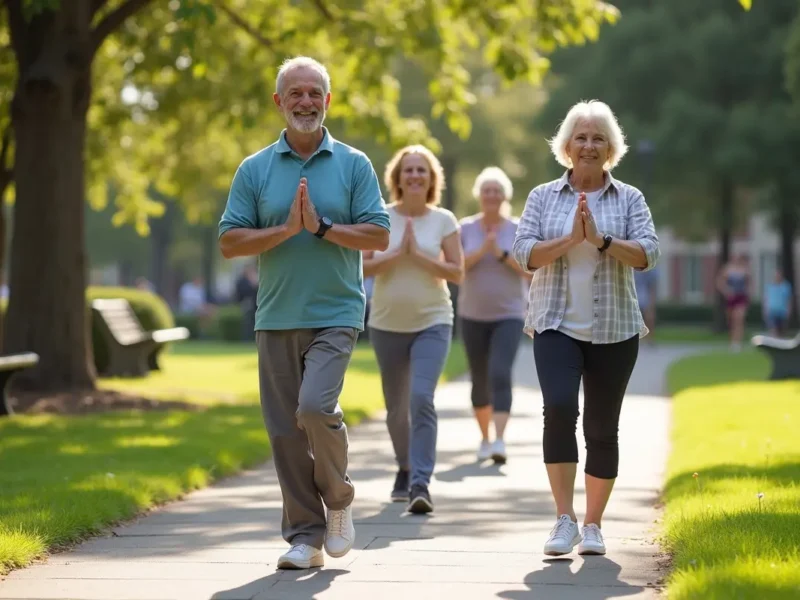Staying socially engaged is one of the cornerstones of healthy brain aging. Individuals who maintain a rich social network are less likely to experience rapid declines in memory or cognitive function. Interaction with others provides mental stimulation, emotional reassurance, and encourages regular routines, all of which are essential as we grow older.
Even informal gatherings or engaging with new faces in shared workspaces, such as those in Las Vegas executive suites, can spark meaningful connections. These environments invite purposeful conversation, connection, and collaboration, helping older adults stay mentally alert and emotionally fulfilled.
Research from the Centers for Disease Control and Prevention notes that a lack of social interaction can be as impactful to health as physical inactivity or even smoking. The risk of depression, anxiety, and even physical decline escalates in isolated individuals.
Meanwhile, positive social contact, such as participating in group classes, volunteering, or simply catching up with friends, provides a boost in oxytocin and serotonin. These brain chemicals are associated with improved mood, reduced stress, and the preservation of cognitive functions. Social connection strengthens the brain’s neural networks, making it easier to recall information and adapt to new situations over time.
Contents
- 1 Physical Activity: More Than Just Moving
- 2 How Nutrition Shapes Memory and Cognition
- 3 The Power of Sleep in Mental Fitness
- 4 Cognitive Rehabilitation and Skill-Building
- 5 Stress Management and Building Resilience
- 6 Helpful Tools and Technology for Supporting Brain Health
- 7 Building Long-Term Habits for Sharper Minds
Physical Activity: More Than Just Moving
Consistent physical activity benefits the brain just as much as the body. Exercise increases oxygenation and blood flow, delivering nutrients the brain needs to function at its best. Regular movement triggers the release of neurotrophic factors, proteins that stimulate the growth of new brain cells and connections. For example, aerobic activities, such as brisk walking, cycling, or swimming, have been proven to begin boosting mental alertness within weeks.
For older adults, exercise reduces brain fog, enhances mood, and helps prevent conditions like stroke, diabetes, and heart disease that are linked to cognitive decline. Even low-impact workouts, such as tai chi or gentle yoga, can improve balance, flexibility, and executive function. Experts at the CDC recommend at least 150 minutes of moderate physical activity each week for significant benefits to both the brain and body. Structured group activities also layer in the bonus of social interaction and accountability, doubling the positive effect on brain function.
How Nutrition Shapes Memory and Cognition
Nutrition is a crucial yet often overlooked component of cognitive well-being. The food older adults consume directly influences how the brain operates, affecting everything from focus and attention to long-term memory retention.
Diets that prioritize variety, rich in whole grains, fresh vegetables, fruits, healthy fats, and lean proteins, deliver antioxidants, vitamins, and minerals that fight the oxidative stress and inflammation linked with brain aging. Notably, foods like salmon, chia seeds, and walnuts provide omega-3 fatty acids, which are fundamental for maintaining healthy cells and neuron communication.
- Berries: Packed with flavonoids and antioxidants, berries can slow down memory decline and boost brain cell health.
- Leafy Greens: High levels of vitamin K, lutein, and folate are associated with slower cognitive decline.
- Whole Grains: Supply the brain with steady energy and promote blood flow, supporting clear thinking.
- Healthy Fats: Olive oil, nuts, and avocados help form protective barriers for neurons and reduce inflammation.
Adopting a “brain-healthy” diet not only supports cognitive health but can also strengthen social bonds, such as through cooking clubs or shared meals with friends and family. When nutritional routines are combined with other healthy lifestyle choices, the effects on memory and cognition may be even more significant.
The Power of Sleep in Mental Fitness
Good sleep is a key pillar supporting cognitive resilience. Quality sleep allows for neural repair, memory encoding, and emotional regulation. During restful sleep cycles, the brain processes new experiences, eliminates waste products, and reinforces the pathways necessary for effective thought and memory. Disrupted sleep, whether from insomnia, apnea, or restless habits, correlates strongly with attention issues, increased risk of depression, and memory loss in older adults.
- Stick to a regular bedtime and wake-up schedule for optimal rest.
- Create a calming, dark, and cool environment in the bedroom to encourage deeper sleep.
- Avoid screens and caffeine in the evening, and wind down with soothing music or a warm bath.
According to reports from Scientific American, high-quality sleep may help clear beta-amyloid proteins, which are linked to Alzheimer’s disease, from the brain. In the long term, sleep hygiene and consistent bedtime routines are among the most cost-effective tools for preserving cognitive function as we age.
Cognitive Rehabilitation and Skill-Building
Exercising the mind is just as vital as keeping the body fit. Cognitive rehabilitation refers to structured activities and therapies that help individuals build and maintain the mental skills needed for daily life. While often used in the context of recovery from injury, these techniques are valuable for anyone aiming to defend against age-related decline. Challenging the brain with logic puzzles, strategy games, or foreign language learning compels neurons to adapt and rebuild, a phenomenon known as neuroplasticity.
Participating in lifelong learning activities keeps the mind curious and agile. Older adults who continue to pursue new hobbies, such as learning an instrument, painting, or enrolling in adult education classes, demonstrate improved concentration and memory compared to their less-engaged peers. Such activities foster independence, creativity, and can also deliver a mood boost and a renewed sense of purpose.
Stress Management and Building Resilience
Persistent, uncontrolled stress is a well-documented risk factor for a range of cognitive issues, including memory impairment and difficulties in learning. Chronic exposure to high levels of cortisol, the primary hormone released in response to stress, can lead to a reduction in the size and functionality of critical brain regions such as the hippocampus, which plays a vital role in forming and retrieving memories. In contrast, consistently practicing healthy stress management techniques can foster brain resilience, thereby enhancing the mind’s adaptability and overall cognitive function.
Activities such as meditation, which encourage mindfulness and present-moment awareness, focused breathing exercises that regulate the body’s stress response, and gentle physical movement through disciplines like yoga or tai chi, stimulate the parasympathetic nervous system. This response helps reset the body’s stress levels and significantly reduces harmful inflammation associated with chronic stress.
Engaging in supportive group activities can also be highly beneficial. For instance, participating in mindfulness meetups provides a communal space for sharing experiences and practicing mindfulness techniques. At the same time, laughter yoga promotes physical well-being and emotional release through the act of joyful laughter, which has been shown to lower cortisol levels.
Creative arts sessions, such as painting or writing workshops, not only encourage self-expression but also foster connection and reduce feelings of isolation among participants. By actively embracing and integrating practical stress management techniques, older adults cultivate an optimal environment for their brains, allowing for healing, growth, and the potential to flourish cognitively and emotionally.
Helpful Tools and Technology for Supporting Brain Health
Technology offers powerful help for supporting brain health as we age. From medication reminders and hydration trackers to guided meditation apps, modern digital tools have transformed daily routines. Wearables can track steps, heart rate, and even analyze sleep quality, providing both motivation and real-time feedback to support healthy habits. Digital games and training apps challenge memory and problem-solving skills, keeping mental reflexes fast and sharp.
- Mobile applications that schedule and remind users about medication, hydration, and meals
- Fitness trackers monitor daily steps and prompt gentle movements
- Virtual classes and telemedicine are connecting older adults to education and healthcare
Forbes notes that smart home technology and voice assistants are quickly becoming trusted companions for older adults, enabling them to stay engaged and independent for longer. These resources also offer peace of mind to families by ensuring reminders, safety check-ins, or emergency notifications are always accessible.
Building Long-Term Habits for Sharper Minds
Lifelong cognitive wellness is built not from one big change, but from many small improvements over time. Developing and maintaining healthy habits, regular meals, physical activity, quality sleep, stress reduction, and social engagement pays enormous dividends. The earlier and more consistently someone starts, the greater their protection against future memory loss or decline.
It’s always possible to take the first step: join a club, sign up for a class, try a new recipe packed with superfoods, or set a sleep routine. Every positive adjustment, no matter how small, strengthens both mind and body. Embracing a holistic lifestyle leads to greater clarity, independence, and satisfaction as we age, providing the best foundation for a resilient brain and a fulfilling life.


